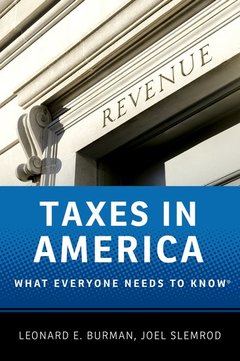Taxes in america: what everyone needs to know (series: what everyone needs to know) What Everyone Needs to Know What Everyone Needs To Know Series
Langue : Anglais
Auteurs : Burman Leonard E., Slemrod Joel

Despite their passion and fury, contemporary Americans are remarkably clueless about how their tax system works. But with heated debates over taxation now roiling Congress and the nation, an understanding of the American tax system is of vital importance. Taxes in America, by preeminent tax scholars Leonard E. Burman and Joel Slemrod, offers a clear, concise explanation of how the American tax system works, how it affects people and businesses, and how it might be improved. Accessibly written and organized in a clear, question-and-answer format, the book describes the intricacies of the modern tax system in an easy-to-grasp manner. Burman and Slemrod begin with the basic definitions of taxes and then delve into more complicated and indeed contentious concerns. They address such questions as how to recognize Fool's Gold tax reform plans. How much more tax could the IRS collect with better enforcement? How do tax burdens vary around the world? Why do corporations pay so little tax, even though they earn trillions of dollars every year? And what kind of tax system is most conducive to economic growth?
I. How are we taxed?. 1. The view from 35,000 feet. a. Why is everyone always so worked up about taxation?. b. What is a tax?. c. What are the major kinds of taxes?. d. How are taxes like ducks?. e. Are there "hidden" taxes?. f. Are there ways to raise revenue other than taxes?. g. How can regulations be like taxes?. h. How have taxes changed over time?. i. How do they vary across states?. j. How do tax burdens vary around the world?. k. How does the composition of tax change between fed, state, and local?. l. Federal taxes in the US have been at about 18 percent of GDP for 50 years. Does that mean that this is the natural rate of taxation?. m. Why is the long-term fiscal outlook so dire?. 2. PERSONAL INCOME TAXES. a. What's the difference between a personal tax and a business tax?. i. Why do economists say that it doesn't matter who actually pays a tax?. ii. Aren't there cases in practice where it does matter who writes the check?. b. What is the personal income tax?. i. What's the difference between a credit, deduction, and exemption?. ii. What's a refundable tax credit?. 1. What are the biggest refundable credits?. iii. Is it true that most people don't pay income taxes?. 1. Who are they? Why does it happen?. 2. Is that bad for democracy?. c. Do we tax capital income as much as labor income?. i. What's the effect of tax breaks for pensions and retirement accounts?. ii. How do we tax capital gains and dividends? Why do we do it that way?. iii. Would a Scandinavian style dual income tax make more sense?. iv. Are there other better options to lessen the tax burden on capital?. d. What is "economic income" Why don't we tax that?. i. You want to tax my imputed rent?????. e. What is the AMT?. i. Where the heck did it come from and why is it so hard to get rid of?. f. Does Uncle Sam really want you to live in sin?. g. How does inflation affect the income tax?. h. What are payroll taxes, and how are they different from income taxes?. 3. BUSINESS INCOME TAXES. a. How do we tax corporations' income?. b. Why tax corporations?. c. Corporations earn trillions of dollars every year. Why do they pay so little tax?. i. Who pays the corporate income tax?. ii. Why is it hard to tell who ultimately bears the burden of the corporate income tax?. d. Why do economist say that we "double tax" corporation income?. i. What are the impacts of double-taxing corporate income?. ii. What would happen if we just eliminated the corporate income tax?. e. How can some companies get away with paying no income tax despite billions in profits?. i. Why is it troublesome that some companies view their tax departments as profit centers?. f. What is depreciation?. i. Why not let businesses write off their investments right away?. ii. What is "bonus depreciation?". iii. What are investment tax credits?. g. Are there implicit spending programs run through the corporate income tax too?. i. Why do we have ethanol tax subsidies, oil and gas special tax breaks, etc.?. h. What are tax havens?. i. What is a foreign tax credit? Why are they allowed?. i. Why do we try to tax corporations on their worldwide income? Why not follow the practice in most of Europe and simply exempt foreign income from tax?. ii. What is transfer pricing? Why is it important to multination
Leonard E. Burman is Professor of Practice, Public Administration and Economics at Maxwell School of Syracuse University. Joel Slemrod is Professor of Economics in the Department of Economics and the Paul W. McCracken Collegiate Professor of Business Economics and Public Policy in the Stephen M. Ross School of Business, at the University of Michigan.
Date de parution : 01-2013
Ouvrage de 224 p.
14.6x20.8 cm
Épuisé
Thèmes de Taxes in america: what everyone needs to know ... :
© 2024 LAVOISIER S.A.S.



